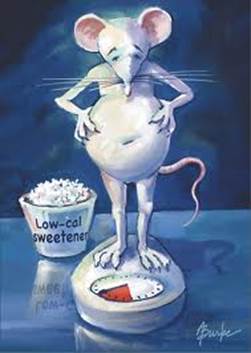

In a study published in this month's Diabetes Care journal, researchers in the University's School of Medicine and the Nerve-Gut Laboratory, led by PhD student Dr Tongzhi Wu have found that artificially sweetened drinks produced no different response in the healthy human gut to a glass of water.

"This is a controversial area because there's a lot of conflicting research into artificial sweeteners," says senior author Associate Professor Chris Rayner, from the University of Adelaide's School of Medicine and Consultant Gastroenterologist at the Royal Adelaide Hospital.

Co-author Dr Richard Young, Senior Postdoctoral Researcher in the University's Nerve-Gut Research Laboratory, says population-level studies have yet to agree on the effects of long-term artificial sweetener intake in humans.

However, a recent study by Brown et al.in healthy humans reported that oral ingestion of “diet soda,” containing both sucralose (46 mg) and acesulfame potassium (AceK) (26 mg), augmented GLP-1 release by more than one-third after an oral glucose load given 10 min later compared with carbonated water, suggesting a potential synergy between artificial sweeteners and glucose in stimulating GLP-1 secretion. "Those studies indicate that artificial sweeteners may interact with the gut in the longer term, but so far no-one's managed to determine the actual mechanisms through which these sweeteners act," Dr Young says.

"So far it appears that artificial sweeteners have limited impact in the short term, but in people in a pre-diabetic or diabetic state, who are more likely to be regularly high users of artificial sweeteners, it might be a different story altogether. This is why more research is needed," Dr Young says.
Comment: This study however, has not conclusively proven the safety of artificial sweeteners for daily use.
Editor: JDC Diabetes Gems

 In a study published in this month's Diabetes Care journal, researchers in the University's School of Medicine and the Nerve-Gut Laboratory, led by PhD student Dr Tongzhi Wu have found that artificially sweetened drinks produced no different response in the healthy human gut to a glass of water.
In a study published in this month's Diabetes Care journal, researchers in the University's School of Medicine and the Nerve-Gut Laboratory, led by PhD student Dr Tongzhi Wu have found that artificially sweetened drinks produced no different response in the healthy human gut to a glass of water.